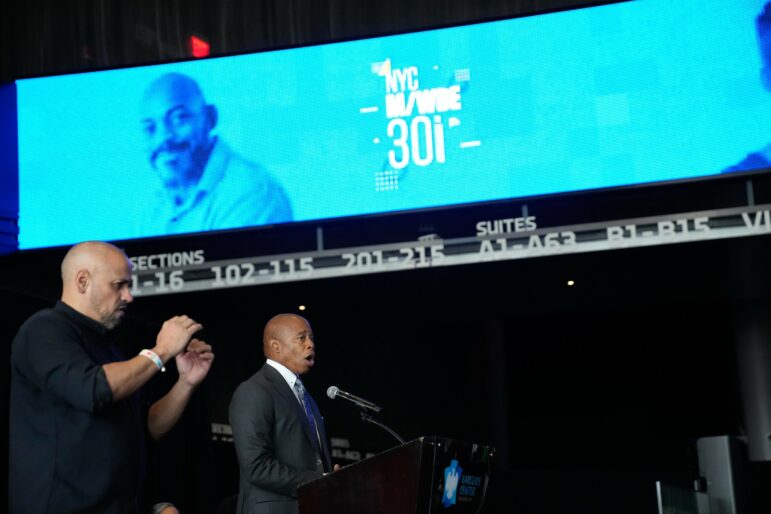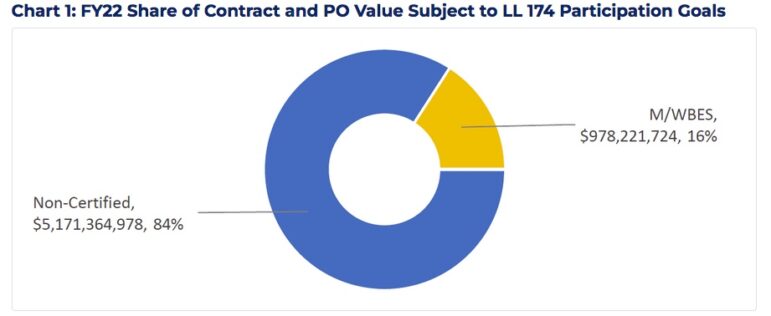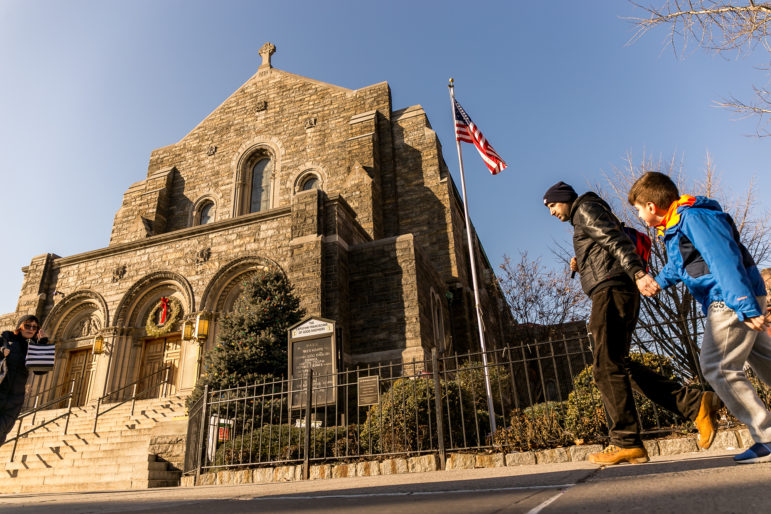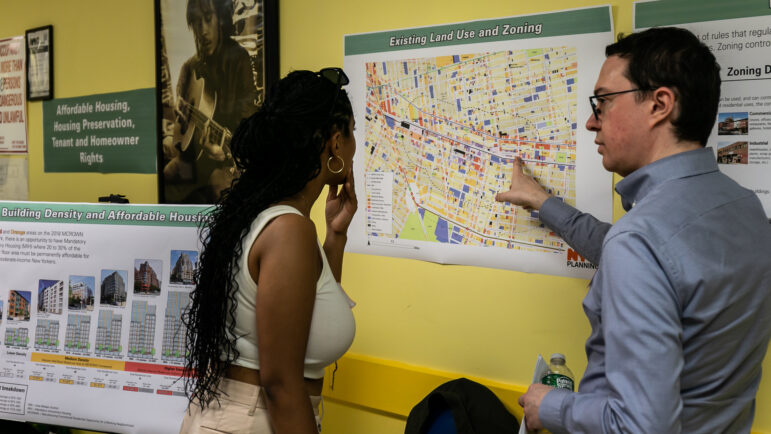According to the latest Comptroller’s report, Black and Latino‐owned businesses each received under 2 percent of city contract dollars in fiscal year 2022, and only 5 percent of all new city contracts and purchase orders registered during that same period went to city‐certified minority or women‐owned business enterprises.

Michael Appleton/Mayoral Photography Office
Mayor Adams addresses the crowd at the city’s Minority- and Women-Owned Business Enterprises (M/WBE) Procurement Fair in September 2022.
For years, New York City has struggled to spend public dollars and do business with suppliers that reflect the diverse and international population that makes up the five boroughs.
During the last fiscal year, which ended in July, the city’s share of contracts with Minority and Women‐Owned Business Enterprises (M/WBEs) remained at pitifully low levels, according to a report released Tuesday by Comptroller Brad Lander.
His office’s latest annual report on the city’s contracting efforts—which in previous years was called “Making the Grade” and was letter graded—found that Black and Latino‐owned businesses each received under 2 percent of city contract dollars in fiscal year 2022, and only 5 percent of all new contracts and purchase orders registered went to certified M/WBEs.
In the agencies designated by the mayor to conduct equity assessments under Local Law 174 (LL 174), which requires special attention to race, gender, income, and sexual orientation, the picture was better, but also not great: just 15.9 percent of contracts went to M/WBE firms, down slightly from the year prior.
The three agencies subject to LL 174 that hired the most M/WBE firms were the Department of Buildings, where 79.6 percent of its contract value subject to the law went to M/WBEs; the Department of Cultural Affairs, with 85.2 percent; and the Department of Small Business Services (SBS) at 90.1 percent. SBS was also one of the three most improved agencies when it came to contracting with more M/WBEs from FY20 to FY22.
According to the report, the Finance Department (DOF) had the lowest share of contract value subject to LL 174 registered to M/WBEs, at 7.4 percent. A spokesperson from the department said that their M/WBE unit has been working to expand opportunities for these contractors, without detailing the obstacles.
“While we are continually working to improve this process, and remain committed to implementing concrete steps under the leadership of Mayor Adams, we are encouraged by the increase we have seen in eligible contracts and P.O.s for M/WBEs with DOF as well as an increase in overall spending for DOF’s M/WBE subcontracts,” a DOF spokesman said.
Despite coming in last this year, the agency improved its metrics compared to past years: its percentage of eligible contracts and purchase orders for MWBEs increased from 3.03 percent in FY20 to 7.43 percent in FY22, while DOF’s MWBE subcontract spending has also trended upward, from 8.5 percent in FY20 to 14.71 percent in FY22.

While some progress has been made by some municipal agencies to increase the number of contracts they award to M/WBEs, the city still overwhelmingly works with non-certified firms, and M/WBEs are more likely to get less lucrative contracts: The average value of a new contract registered in FY22 to a non-certified firm was $5.01 million, compared to the M/WBE average of $679,000, the report said.
To make matters more complicated for M/WBE contractors, about 55 percent of their new contracts were retroactive in FY22, meaning they weren’t registered with the city until after their contract period began, delaying payments and putting vendors under liquidity pressure. “In some circumstances,” the report explains, “it means M/WBEs are providing City services without any guarantee of pay.”
“This is especially challenging given that average M/WBE contract sizes are smaller, and that many M/WBEs are small businesses that lack sufficient working capital and may have a more challenging time borrowing from traditional lending institutions,” the report adds.
Mayor Eric Adams has acknowledged the inequities in how the city does business, referring to “disparity within a disparity” in the contracting process on Feb. 16, when he signed an executive order focused on increasing participation of Black American, Hispanic American, and Native-American M/WBEs and Asian-American WBEs—“all groups that have been persistently and negatively impacted by procurement inequities.”
While certain gender and ethnic groups of M/WBEs remain more disproportionately under-contracted than others, the overall disparities among M/WBEs remain striking, the report highlights.
“Black (male- and women-owned) M/WBEs, Hispanic American (male- and women-owned) M/WBEs, Asian American women-owned MBEs, and Native American M/WBEs (male- and women-owned) each represent less than 2 percent of the value of all FY22 registered contracts subject to LL 174 participation goals,” describes the report. More than 70 percent of the value of M/WBE contracts was awarded to firms owned by white women and Asian American men, it added.
In response to the comptroller’s findings, Mayor Eric Adams said that more than a quarter of eligible contracts were awarded to M/WBE contractors in the first three-quarters of his administration, but acknowledged that more can be done to increase equity. “That’s why we’ve already made clear to city agencies that they will be required to provide more regular updates on how they are progressing to meet their M/WBE goals,” Adams said in a statement.
In both this year’s State of the City address and in 2022, Adams has put forward ambitious goals for doubling M/WBE procurement to award $25 billion in contracts over the next four years, and $60 billion over the next eight years.
As part of the report, New York City Comptroller Brad Lander made five recommendations for helping the city meet those benchmarks: ensuring M/WBE’s access to higher-value contracts; expanding the use of discretionary award methods; reforming the subcontracting process and getting vendors paid on time.
“We appreciate the recommendations in today’s report, and still recognize we have a long way to go on the road to increasing access for groups that have been persistently and negatively impacted by procurement inequities,” Adams said in a statement.









One thought on “NYC Still Falling Short in Effort to Diversify Contracting, Report Says”
The goal of increasing contracts awarded to M/WBE businesses and dollars spent on M/WBE vendors is the right goal. Hopefully in trying to make improvements that will help reach the goal the city will seek input from a diverse group of stakeholders: certified M/WBE businesses/vendors, non-M/WBE city contract holders who have M/WBE spending requirements, M/WBE cntract applicants who were not awarded contracts, etc. It’s likely that there are challanges unique to each part of the system.